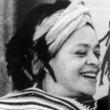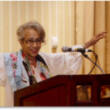By the Light of My Father's Smile: A Novel
(Libby/OverDrive eBook, Kindle)
Available Platforms
Description
Also in this Series
Published Reviews
Booklist Review
Passionate about her beliefs, Walker risks burdening her art with her polemics. In her first novel since her dramatic look at female circumcision, Possessing the Secret Joy (1992), female sexuality is her focus, but Walker has widened the circle to embrace familial love, eros, and the afterlife. The Robinsons, black anthropologists, were unable to get funding during the 1950s for their study of the Mundo, an isolated black and Indian tribe living in Mexico. The patriarch gamely poses as a minister, and the couple bring their young daughters, Susannah and Magdalena, to the wilds of the Sierra Madre. Predictably enough, their immersion in Mundo culture has profound and unforeseen consequences, all connected to sex. Even though the adults enjoy an ardent sexual relationship, one that Walker describes in exacting, not to say instructive, detail, the father is outraged by his younger daughter's ecstatic involvement with a Mundo boy, and his violent response leaves an indelible mark on them all. As Walker explains why in vivid flashbacks, she shifts point of view between men and women, and the living and the dead. As the novel begins, for instance, Susannah's recently deceased father watches her and her Greek husband make love, then later, in another boldly explicit scene, he observes her great pleasure in bed with her lesbian lover. Whether the scene is Mexico, the States, or Greece (the locale for the novel's most arresting passages), or whether the liaisons depicted are lasting or fleeting, the message Walker conveys is that sex brings us closer to God, that, as the Mundo believe, "spirituality resides in the groin, in the sexual organs." This is a seductive but flimsy foundation on which to base a novel, and Walker has created a romantic but propagandistic fairy tale that veers disconcertingly from the facile to the heartfelt. --Donna Seaman
Publisher's Weekly Review
A passionate but somewhat misguided polemic against the abuses of patriarchy, Walker's first novel since Possessing the Secret of Joy (1992) tells the story of two daughters who overcome the sexual repression forced on them by their anthropologist father. In the early 1940s, the Robinson family travels to rural Mexico, where Mr. Robinson (who, unnamed, narrates most of the novel from beyond the grave) and his wife, Langley, are studying a doomed people known as the Mundo, the wise, egalitarian descendants of escaped slaves and Indians. The central event of the book comes when Mr. Robinson, ordinarily a gentle man, finds his 15-year-old daughter Magdalena having sex with a local boy, Manuelito, and beats her, in a scene witnessed by Magdalena's younger sister, Susannah. To the relief of Mr. Robinson's repentant ghost, both daughters find ways of fulfilling themselves despite this trauma: after an encounter with a fortune-telling dwarf (the village outcast in the native home of Susannah's Greek husband), Susannah leaves her husband and enters into a loving lesbian relationship; Magdalena, now a hugely obese academic, bumps into Manuelito (now an alcoholic, crippled, impotent Vietnam vet) on an airplane and, against all oddsin the book's one disappointingly reticent love scenereconsummates their love. The deeper reconciliation between father and daughters takes place in the spirit realm. Even Walker's fans are likely to find the novel hard going, as the narrative moves confusingly back and forth between living and dead characters, the past and the present. Between the highly schematic plot and the characters' habit of speaking in self-righteous pieties and (fictitious) indigenous proverbs, Walker can test one's patience. Yet her spare, charged language, and her earnestness (whatever one may think of her extravagant historical claims or her essentialism in matters of race) will no doubt continue to win her a wide readership. Author tour. Editor, Kate Medina; agent, Wendy Weil. (Sept.) (c) Copyright PWxyz, LLC. All rights reserved
Library Journal Review
Walker's (Possessing the Secret of Joy, LJ 5/15/92) first novel in six years is an exploration of sexuality and how society's attitudes toward it have damaged both men and women. Susannah and Magdalena are sisters estranged from each other and their parents since adolescence, after Magdalena is beaten by their father for having sex. As each woman expresses her loneliness and angerSusannah through sexual exploration, Magdalena through foodthey are observed by their father's ghost, who seeks a reconciliation with them that comes only after their deaths. In spite of a strong and poetic beginning, the book is more like a Walker essay than a novel, as the characters expound upon a wide range of topics, from the influence of the Ice Age on the European psyche to the the legacy of the Vietnam War. Sadly, they lack the humanity that made Walker's earlier novels so moving and inspiring. However, fan interest and the author's stature will make this a required purchase for most libraries.Ellen Flexman, Brown Branch, Indianapolis-Marion Cty. P.L., IN (c) Copyright 2010. Library Journals LLC, a wholly owned subsidiary of Media Source, Inc. No redistribution permitted.
Kirkus Book Review
Another idiosyncratic novel from Walker (Possessing the Secret of Joy, 1992, etc.), moving and puzzling by turns. Ostensibly about the search of Susannah, a successful novelist, to come to terms with her past, the book often reads more like a series of mournful lectures about the ravages inflicted on the planet, and on women, by the white patriarchy. Susannah has been fortunate enough to spend much of her childhood among the Mundo, a deeply spiritual tribe in the Sierra Madres, descendants of Mexican Indians and escaped slaves. Susannah and her sister Magdalena are taken to live with the Mundo by their parents, enthusiastic amateur anthropologists, partly to allow the family, who are African-Americans, to escape some of the violence visited on blacks in 1950s America. Susannah takes a nurturing sense of spirituality from her stay with the Mundo. Her sister, Magdalena, however, is badly scarred by the manner of their leaving: Discovering that the adolescent Magdalena has taken a Mundo boy as a lover, her father beats her and sweeps his family back to the States. The novel, narrated in the voices of a number of characters (living and dead), follows Susannah and Magdalena's varying paths: the writer Susannah takes lovers and restlessly searches for enlightenment; the self-destructive Magdalena becomes an academic and is only redeemed when she reunites briefly with her Mundo lover, though too late to stop her slide toward suicide. Susannah's peace is helped not only her knowledge of the Mundo but by several ghosts and a wise, elderly Greek woman, a devotee of the old fecund religion of the Goddess. Walker is still a wonderful storyteller, offering a prose of great lucidity, but many of the characters here seem unbelievably serene and rather one-dimensional, with the discursive tale offering too little action, and too many lectures. An uncomfortable mix of visionary fable and screed. (Author tour)
Booklist Reviews
Passionate about her beliefs, Walker risks burdening her art with her polemics. In her first novel since her dramatic look at female circumcision, Possessing the Secret Joy (1992), female sexuality is her focus, but Walker has widened the circle to embrace familial love, eros, and the afterlife. The Robinsons, black anthropologists, were unable to get funding during the 1950s for their study of the Mundo, an isolated black and Indian tribe living in Mexico. The patriarch gamely poses as a minister, and the couple bring their young daughters, Susannah and Magdalena, to the wilds of the Sierra Madre. Predictably enough, their immersion in Mundo culture has profound and unforeseen consequences, all connected to sex. Even though the adults enjoy an ardent sexual relationship, one that Walker describes in exacting, not to say instructive, detail, the father is outraged by his younger daughter's ecstatic involvement with a Mundo boy, and his violent response leaves an indelible mark on them all. As Walker explains why in vivid flashbacks, she shifts point of view between men and women, and the living and the dead. As the novel begins, for instance, Susannah's recently deceased father watches her and her Greek husband make love, then later, in another boldly explicit scene, he observes her great pleasure in bed with her lesbian lover. Whether the scene is Mexico, the States, or Greece (the locale for the novel's most arresting passages), or whether the liaisons depicted are lasting or fleeting, the message Walker conveys is that sex brings us closer to God, that, as the Mundo believe, "spirituality resides in the groin, in the sexual organs." This is a seductive but flimsy foundation on which to base a novel, and Walker has created a romantic but propagandistic fairy tale that veers disconcertingly from the facile to the heartfelt. ((Reviewed June 1 & 15, 1998)) Copyright 2000 Booklist Reviews
Library Journal Reviews
Walker's (Possessing the Secret of Joy, LJ 5/15/92) first novel in six years is an exploration of sexuality and how society's attitudes toward it have damaged both men and women. Susannah and Magdalena are sisters estranged from each other and their parents since adolescence, after Magdalena is beaten by their father for having sex. As each woman expresses her loneliness and anger Susannah through sexual exploration, Magdalena through food they are observed by their father's ghost, who seeks a reconciliation with them that comes only after their deaths. In spite of a strong and poetic beginning, the book is more like a Walker essay than a novel, as the characters expound upon a wide range of topics, from the influence of the Ice Age on the European psyche to the the legacy of the Vietnam War. Sadly, they lack the humanity that made Walker's earlier novels so moving and inspiring. However, fan interest and the author's stature will make this a required purchase for most libraries. Ellen Flexman, Brown Branch, Indianapolis-Marion Cty. P.L., IN Copyright 1998 Library Journal Reviews
Publishers Weekly Reviews
A passionate but somewhat misguided polemic against the abuses of patriarchy, Walker's first novel since Possessing the Secret of Joy (1992) tells the story of two daughters who overcome the sexual repression forced on them by their anthropologist father. In the early 1940s, the Robinson family travels to rural Mexico, where Mr. Robinson (who, unnamed, narrates most of the novel from beyond the grave) and his wife, Langley, are studying a doomed people known as the Mundo, the wise, egalitarian descendants of escaped slaves and Indians. The central event of the book comes when Mr. Robinson, ordinarily a gentle man, finds his 15-year-old daughter Magdalena having sex with a local boy, Manuelito, and beats her, in a scene witnessed by Magdalena's younger sister, Susannah. To the relief of Mr. Robinson's repentant ghost, both daughters find ways of fulfilling themselves despite this trauma: after an encounter with a fortune-telling dwarf (the village outcast in the native home of Susannah's Greek husband), Susannah leaves her husband and enters into a loving lesbian relationship; Magdalena, now a hugely obese academic, bumps into Manuelito (now an alcoholic, crippled, impotent Vietnam vet) on an airplane and, against all odds in the book's one disappointingly reticent love scene reconsummates their love. The deeper reconciliation between father and daughters takes place in the spirit realm. Even Walker's fans are likely to find the novel hard going, as the narrative moves confusingly back and forth between living and dead characters, the past and the present. Between the highly schematic plot and the characters' habit of speaking in self-righteous pieties and (fictitious) indigenous proverbs, Walker can test one's patience. Yet her spare, charged language, and her earnestness (whatever one may think of her extravagant historical claims or her essentialism in matters of race) will no doubt continue to win her a wide readership. Author tour. Editor, Kate Medina; agent, Wendy Weil. (Sept.) Copyright 1998 Publishers Weekly Reviews
Reviews from GoodReads
Citations
Walker, A. (2012). By the Light of My Father's Smile: A Novel . Random House Publishing Group.
Chicago / Turabian - Author Date Citation, 17th Edition (style guide)Walker, Alice. 2012. By the Light of My Father's Smile: A Novel. Random House Publishing Group.
Chicago / Turabian - Humanities (Notes and Bibliography) Citation, 17th Edition (style guide)Walker, Alice. By the Light of My Father's Smile: A Novel Random House Publishing Group, 2012.
Harvard Citation (style guide)Walker, A. (2012). By the light of my father's smile: a novel. Random House Publishing Group.
MLA Citation, 9th Edition (style guide)Walker, Alice. By the Light of My Father's Smile: A Novel Random House Publishing Group, 2012.
Copy Details
| Collection | Owned | Available | Number of Holds |
|---|---|---|---|
| Libby | 1 | 1 | 0 |

































